Latest Sheet Music
Paul Fujimoto

Paul Fujimoto NYC based Composer/Lyricist of the new musical CORNER OF BITTER AND SWEET, based on the New York Times-
3 Doors Down

3 Doors Down is an American rock band formed in 1994 in Escatawpa, Mississippi by Brad Arnold (vocals and drums), Matt Roberts (guitar) and Todd Harrell (bass). The band signed to Universal Records after the success of their song "Kryptonite". The band has since sold well over 15 million albums worldwide since their debut album, The Better Life, which was released in 2000. They also perform more than 300 concerts a year and have shared the stage with other artists such as Tantric, Lynyrd Skynyrd, Staind, Nickelback, Alter Bridge, Breaking Benjamin, Econoline Crush, Hinder, Seether, Shinedown, Finger Eleven, and Daughtry. Hit song It's Not My Time is featured in the video game NHL 09.
Oliver Messiaen
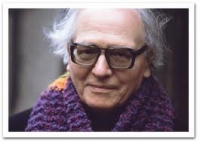
Olivier Messiaen (French pronunciation: ; December 10, 1908 – April 27, 1992) was a French composer, organist and ornithologist, one of the major composers of the 20th century. His music is rhythmically complex (he was interested in rhythms from ancient Greek and from Hindu sources); harmonically and melodically it is based on modes of limited transposition, which he abstracted from his early compositions and improvisations. Many of his compositions depict what he termed "the marvellous aspects of the faith", and drew on his deeply held Roman Catholicism.
Don Moen

Don Moen (born June 29, 1950 in Minneapolis, Minnesota) is an American singer-songwriter, pastor, and producer of Christian worship music.
Moen produced 11 volumes for the Hosanna! Music series of worship albums. His first album under his own name, Worship with Don Moen, was released in 1992. His music has total global sales of over five million units. He worked for Integrity Media for over 20 years, serving as creative director and president of Integrity Music, president of Integrity Label Group, and an executive producer of Integrity Music albums. He left Integrity Media in 2008 to start a new initiative, The Don Moen Company. Moen received a Dove Award for his work on the musical God with Us in addition to amassing nine nominations for his songs. Moen is also a prolific songwriter, having worked with Claire Cloninger, Paul Overstreet, Martin J. Nystrom, Randy Rothwell, Ron Kenoly, Bob Fitts, Debbye Graafsma, Paul Baloche, Tom Brooks, among many others. He has also worked with talented musicians, Justo Almario, Abraham Laboriel, Alex Acuna, and Carl Albrecht. His name is associated with some of the most well-known songs in Contemporary Christian Music. He was a student at Oral Roberts University. He lives in Nashville, Tennessee, with his wife Laura and their five children.
Moen produced 11 volumes for the Hosanna! Music series of worship albums. His first album under his own name, Worship with Don Moen, was released in 1992. His music has total global sales of over five million units. He worked for Integrity Media for over 20 years, serving as creative director and president of Integrity Music, president of Integrity Label Group, and an executive producer of Integrity Music albums. He left Integrity Media in 2008 to start a new initiative, The Don Moen Company. Moen received a Dove Award for his work on the musical God with Us in addition to amassing nine nominations for his songs. Moen is also a prolific songwriter, having worked with Claire Cloninger, Paul Overstreet, Martin J. Nystrom, Randy Rothwell, Ron Kenoly, Bob Fitts, Debbye Graafsma, Paul Baloche, Tom Brooks, among many others. He has also worked with talented musicians, Justo Almario, Abraham Laboriel, Alex Acuna, and Carl Albrecht. His name is associated with some of the most well-known songs in Contemporary Christian Music. He was a student at Oral Roberts University. He lives in Nashville, Tennessee, with his wife Laura and their five children.
Abel Fleury

Fleury was one of the first broadcasters of Latin American music in Europe, interpreting national authors as Adolfo Luna, Pedro Herrera, Gomez Crespo, Tremsal, Juan de Dios Filiberto, Joaquín López Flores, the Paraguayan Agustín Barrios, Felix Perez Cardozo, Pablo Escobar, the Uruguayan Eduardo Favini, Rubén Menéndez, Isaias Savio, Martinez Oyanguren. Hector G. Costa, the Brazilian Alberto Scupinari, Villa Lobos, Reis Dilermando, Lorenzo Fernandez, Eduardo Caba Bolivia and Venezuela's Antonio Lauro. His repertoire also included classical authors: Bach, Mozart, Handel, Sor, Tarrega, Schubert.
Hairspray
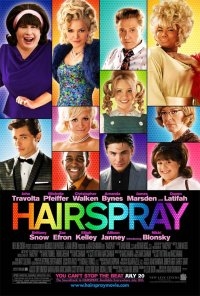
Hairspray is a 2007 musical film produced by Zadan/Meron Productions and distributed by New Line Cinema. It was released in the United States, Canada, and the United Kingdom on July 20, 2007. The film is an adaptation of the Tony Award-winning 2002 Broadway musical of the same name, and a remake of John Waters' 1988 comedy film of the same name. Set in 1962 Baltimore, Maryland, the film follows a "pleasantly plump" teenager named Tracy Turnblad as she simultaneously pursues stardom as a dancer on a local TV show and rallies against racial segregation.
Adapted from both Waters's 1988 script and Thomas Meehan and Mark O'Donnell's book for the stage musical by screenwriter Leslie Dixon, the 2007 film version of Hairspray is directed and choreographed by Adam Shankman. Hairspray stars John Travolta, Michelle Pfeiffer, Christopher Walken, Amanda Bynes, James Marsden, Queen Latifah, Brittany Snow, Zac Efron, Elijah Kelley, Allison Janney, and introduces newcomer Nikki Blonsky as Tracy Turnblad. Hairspray features songs from the Broadway musical written by Marc Shaiman and Scott Wittman, as well as four new Shaiman/Wittman compositions not present in the original Broadway version.
Opening to mostly positive reviews, Hairspray met with financial success, breaking the record for biggest sales at opening weekend for a movie musical, which the film held until July 2008 when it was surpassed by Mamma Mia!. Hairspray went on to become the fourth highest grossing musical film in U.S. cinema history, behind the film adaptations of Grease, Chicago, and Mamma Mia!. Available in a variety of formats, Hairspray's Region 1 home video release took place on November 20, 2007. The USA Network has purchased the broadcast rights to Hairspray and is scheduled to debut the film on cable television in February 2010.
Adam Shankman and John Waters are currently working on a sequel to the film.
Adapted from both Waters's 1988 script and Thomas Meehan and Mark O'Donnell's book for the stage musical by screenwriter Leslie Dixon, the 2007 film version of Hairspray is directed and choreographed by Adam Shankman. Hairspray stars John Travolta, Michelle Pfeiffer, Christopher Walken, Amanda Bynes, James Marsden, Queen Latifah, Brittany Snow, Zac Efron, Elijah Kelley, Allison Janney, and introduces newcomer Nikki Blonsky as Tracy Turnblad. Hairspray features songs from the Broadway musical written by Marc Shaiman and Scott Wittman, as well as four new Shaiman/Wittman compositions not present in the original Broadway version.
Opening to mostly positive reviews, Hairspray met with financial success, breaking the record for biggest sales at opening weekend for a movie musical, which the film held until July 2008 when it was surpassed by Mamma Mia!. Hairspray went on to become the fourth highest grossing musical film in U.S. cinema history, behind the film adaptations of Grease, Chicago, and Mamma Mia!. Available in a variety of formats, Hairspray's Region 1 home video release took place on November 20, 2007. The USA Network has purchased the broadcast rights to Hairspray and is scheduled to debut the film on cable television in February 2010.
Adam Shankman and John Waters are currently working on a sequel to the film.
Love Story

Love Story is a 1970 romantic drama film written by Erich Segal coordinated with his 1970 best-selling novel. It was directed by Arthur Hiller. The film, well-known as a tear-jerking tragedy, is considered one of the most romantic of all time by the American Film Institute (#9 on the list), and was followed by a sequel, Oliver's Story in 1978. Love Story starred Ali MacGraw and Ryan O'Neal and also marked the film debut of a then-unknown Tommy Lee Jones, who played a minor role in the film.
Vanessa Carlton
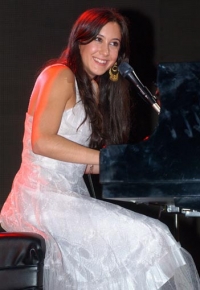
Vanessa Lee Carlton (born August 16, 1980) is an American soft rock/Piano pop singer, songwriter, and pianist best known for the Billboard top five, Grammy-nominated single "A Thousand Miles" from her debut album, Be Not Nobody which was released April 30, 2002, and certified platinum in the U.S.
Her music, along with that of her contemporary Michelle Branch to whom she is sometimes compared, has had an influence on female solo pop singer-songwriters in the 21st century, including Kate Voegele, Lights, Sara Bareilles (another piano pop artist), Colbie Caillat and Tristan Prettyman.
Carlton's second album, Harmonium (released November 9, 2004), debuted at number 33 on the U.S. Billboard 200 and had sold 179,000 copies as of February 2006, with the single "White Houses," peaking at 86 in the U.S. Billboard Hot 100. She subsequently parted company from her record label A&M, though she still holds a dedicated fanbase.
Her third album, Heroes and Thieves, was released on October 9, 2007 by the The Inc./Universal Motown record labels.
Her music, along with that of her contemporary Michelle Branch to whom she is sometimes compared, has had an influence on female solo pop singer-songwriters in the 21st century, including Kate Voegele, Lights, Sara Bareilles (another piano pop artist), Colbie Caillat and Tristan Prettyman.
Carlton's second album, Harmonium (released November 9, 2004), debuted at number 33 on the U.S. Billboard 200 and had sold 179,000 copies as of February 2006, with the single "White Houses," peaking at 86 in the U.S. Billboard Hot 100. She subsequently parted company from her record label A&M, though she still holds a dedicated fanbase.
Her third album, Heroes and Thieves, was released on October 9, 2007 by the The Inc./Universal Motown record labels.
Beethoven

Ludwig van Beethoven (16 December 1770 - 26 March 1827) was a German composer and pianist. He was a crucial figure in the transitional period between the Classical and Romantic eras in Western classical music, and remains one of the most respected and influential composers of all time.
Born in Bonn, then in the Electorate of Cologne (now in modern-day Germany), he moved to Vienna in his early twenties and settled there, studying with Joseph Haydn and quickly gaining a reputation as a virtuoso pianist. Beethoven's hearing gradually deteriorated beginning in his twenties, yet he continued to compose masterpieces, and to conduct and perform, even after he was completely deaf.
Born in Bonn, then in the Electorate of Cologne (now in modern-day Germany), he moved to Vienna in his early twenties and settled there, studying with Joseph Haydn and quickly gaining a reputation as a virtuoso pianist. Beethoven's hearing gradually deteriorated beginning in his twenties, yet he continued to compose masterpieces, and to conduct and perform, even after he was completely deaf.
Rimsky-Korsakov
Nikolai Andreyevich Rimsky-Korsakov (Russian: Никола́й Андре́евич Ри́мский-Ко́рсаков, Nikolaj Andreevič Rimskij-Korsakov, Russian pronunciation: ) (18 March 1844, – 21 June 1908) was a Russian composer, and a member of the group of composers known as The Five. He was a master of orchestration. His best-known orchestral compositions—Capriccio Espagnol, the Russian Easter Festival Overture, and the symphonic suite Scheherazade—are considered staples of the classical music repertoire, along with suites and excerpts from some of his 15 operas. Scheherazade is an example of his frequent use of fairy tale and folk subjects.
Rimsky-Korsakov believed, as did fellow composer Mily Balakirev and critic Vladimir Stasov, in developing a nationalistic style of classical music. This style employed Russian folk song and lore along with exotic harmonic, melodic and rhythmic elements in a practice known as musical orientalism, and eschewed traditional Western compositional methods. However, Rimsky-Korsakov appreciated Western musical techniques after he became a professor of musical composition, harmony and orchestration at the Saint Petersburg Conservatory in 1871. He undertook a rigorous three-year program of self-education and became a master of Western methods, incorporating them alongside the influences of Mikhail Glinka and fellow members of The Five. His techniques of composition and orchestration were further enriched by his exposure to the works of Richard Wagner.
Rimsky-Korsakov believed, as did fellow composer Mily Balakirev and critic Vladimir Stasov, in developing a nationalistic style of classical music. This style employed Russian folk song and lore along with exotic harmonic, melodic and rhythmic elements in a practice known as musical orientalism, and eschewed traditional Western compositional methods. However, Rimsky-Korsakov appreciated Western musical techniques after he became a professor of musical composition, harmony and orchestration at the Saint Petersburg Conservatory in 1871. He undertook a rigorous three-year program of self-education and became a master of Western methods, incorporating them alongside the influences of Mikhail Glinka and fellow members of The Five. His techniques of composition and orchestration were further enriched by his exposure to the works of Richard Wagner.
Linkin Park

Linkin Park is an American rock band from Agoura Hills, California. Since their formation in 1996, the band has sold more than 50 million albums and won two Grammy Awards. They achieved mainstream success with their debut album, Hybrid Theory, which was certified Diamond by the RIAA in 2005. Their following studio album, Meteora, continued the band's success, topping the Billboard 200’s album charts in 2003, and was followed by extensive touring and charity work around the world.
Recognized for their adaptation of the nu metal and rap rock genre into a radio-friendly yet densely-layered style in Hybrid Theory and Meteora, the band moved away from this and explored a variety of other genres in their latest studio album, Minutes to Midnight. The album topped the Billboard charts and had the third best debut week of any album that year. They are also known for their several collaborations, most notably with rapper Jay-Z in their mash-up album Collision Course, and many other artists on Reanimation.
Recognized for their adaptation of the nu metal and rap rock genre into a radio-friendly yet densely-layered style in Hybrid Theory and Meteora, the band moved away from this and explored a variety of other genres in their latest studio album, Minutes to Midnight. The album topped the Billboard charts and had the third best debut week of any album that year. They are also known for their several collaborations, most notably with rapper Jay-Z in their mash-up album Collision Course, and many other artists on Reanimation.
Debussy

Achille-Claude Debussy (August 22, 1862 – March 25, 1918) was a French composer. Along with Maurice Ravel, he is considered one of the most prominent figures working within the field of Impressionist music, though he himself intensely disliked the term when applied to his compositions. Debussy was not only among the most important of all French composers but also was a central figure in all European music at the turn of the twentieth century.
Debussy's music virtually defines the transition from late-Romantic music to twentieth century modernist music. In French literary circles, the style of this period was known as Symbolism, a movement that directly inspired Debussy both as a composer and as an active cultural participant.
Debussy's music virtually defines the transition from late-Romantic music to twentieth century modernist music. In French literary circles, the style of this period was known as Symbolism, a movement that directly inspired Debussy both as a composer and as an active cultural participant.
Blondie
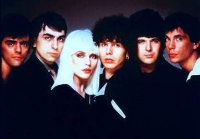
Blondie is an American rock band that first gained fame in the late 1970s and has so far sold over 60 million records. The band was a pioneer in the early American punk rock and new wave scenes. Its first two albums contained strong elements of these genres, and although successful in the United Kingdom and Australia, Blondie was regarded as an underground band in the United States until the release of Parallel Lines in 1978. Over the next three years, the band achieved several hit singles and was noted for its eclectic mix of musical styles incorporating elements of disco, pop and reggae, while retaining a basic style as a new-wave band.
Lead singer Deborah Harry achieved a level of celebrity that eclipsed other band members, leading to tension within the group. Following a poorly received album and with core member Chris Stein diagnosed with a potentially fatal disease, the group disbanded in 1982.
Lead singer Deborah Harry achieved a level of celebrity that eclipsed other band members, leading to tension within the group. Following a poorly received album and with core member Chris Stein diagnosed with a potentially fatal disease, the group disbanded in 1982.
Charles Gounod

Charles-François Gounod (/ɡuːˈnoʊ/; French: ; 17 June 1818 – 17 or 18 October 1893) was a French composer, best known for his Ave Maria, based on a work by Bach, as well as his opera Faust. Another opera by Gounod that is still performed today is Roméo et Juliette.
Gounod died at Saint-Cloud in 1893, after a final revision of his twelve operas. His funeral took place ten days later at the Church of the Madeleine, with Camille Saint-Saëns playing the organ and Gabriel Fauré conducting. He was buried at the Cimetière d'Auteuil in Paris.
Gounod died at Saint-Cloud in 1893, after a final revision of his twelve operas. His funeral took place ten days later at the Church of the Madeleine, with Camille Saint-Saëns playing the organ and Gabriel Fauré conducting. He was buried at the Cimetière d'Auteuil in Paris.
The Prince of Egypt
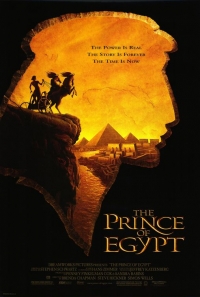
The Prince of Egypt is a 1998 American animated film, the first traditionally animated film produced and released by DreamWorks. The story follows the life of Moses from his birth, through his childhood as a prince of Egypt, and finally to his ultimate destiny to lead the Hebrew slaves out of Egypt, which is based on the Biblical story of Exodus.
Directed by Brenda Chapman, Simon Wells and Steve Hickner, the film featured songs written by Stephen Schwartz and a score composed by Hans Zimmer. The voice cast featured a number of major Hollywood actors in the speaking roles, while professional singers replaced them for the songs. The exceptions were Michelle Pfeiffer, Ralph Fiennes, Steve Martin, and Martin Short, who sang their own parts.
Three soundtracks were released simultaneously for The Prince of Egypt, each of them aimed towards a different target audience. While the other two accompanying records, the country-themed "Nashville" soundtrack and the gospel-based "Inspirational" soundtrack, functioned merely as movie tributes, the official Prince of Egypt soundtrack was the only album to contain tracks from the movie. This album combines elements from the score composed by Hans Zimmer, and movie songs by Stephen Schwartz. The songs were either voiced over by professional singers (such as Salisbury Cathedral Choir), or sung by the movie's voice actors, such as Michelle Pfeiffer and Ofra Haza. Various tracks by contemporary artists such as K-Ci & Jo-Jo and Boyz II Men were added, including the Mariah Carey and Whitney Houston duet "When You Believe", a Babyface rewrite of the original Schwartz composition, sung by Michelle Pfeiffer and Sally Dworsky in the movie.
The film was nominated for best score and won for Best Original Song at the 1999 Academy Awards for "When You Believe". The pop version of the song was performed at the ceremonies by Whitney Houston and Mariah Carey. The song, co-written by Stephen Schwartz, Hans Zimmer and with additional production by Babyface, was nominated for the Best Original Song (Motion Picture) at the 1999 Golden Globes, and was also nominated for Outstanding Performance of a Song for a Feature Film at the ALMA Awards.
Directed by Brenda Chapman, Simon Wells and Steve Hickner, the film featured songs written by Stephen Schwartz and a score composed by Hans Zimmer. The voice cast featured a number of major Hollywood actors in the speaking roles, while professional singers replaced them for the songs. The exceptions were Michelle Pfeiffer, Ralph Fiennes, Steve Martin, and Martin Short, who sang their own parts.
Three soundtracks were released simultaneously for The Prince of Egypt, each of them aimed towards a different target audience. While the other two accompanying records, the country-themed "Nashville" soundtrack and the gospel-based "Inspirational" soundtrack, functioned merely as movie tributes, the official Prince of Egypt soundtrack was the only album to contain tracks from the movie. This album combines elements from the score composed by Hans Zimmer, and movie songs by Stephen Schwartz. The songs were either voiced over by professional singers (such as Salisbury Cathedral Choir), or sung by the movie's voice actors, such as Michelle Pfeiffer and Ofra Haza. Various tracks by contemporary artists such as K-Ci & Jo-Jo and Boyz II Men were added, including the Mariah Carey and Whitney Houston duet "When You Believe", a Babyface rewrite of the original Schwartz composition, sung by Michelle Pfeiffer and Sally Dworsky in the movie.
The film was nominated for best score and won for Best Original Song at the 1999 Academy Awards for "When You Believe". The pop version of the song was performed at the ceremonies by Whitney Houston and Mariah Carey. The song, co-written by Stephen Schwartz, Hans Zimmer and with additional production by Babyface, was nominated for the Best Original Song (Motion Picture) at the 1999 Golden Globes, and was also nominated for Outstanding Performance of a Song for a Feature Film at the ALMA Awards.
Fiddler on the Roof

Fiddler on the Roof is a musical with music by Jerry Bock, lyrics by Sheldon Harnick, and book by Joseph Stein, set in csarist Russia in 1905.
Fiddler on the Roof was originally entitled Tevye. It is based on Tevye and his Daughters (or Tevye the Milkman) and other tales by Sholem Aleichem which he wrote in Yiddish and published in 1894. The story centers on Tevye, the father of five daughters, and his attempts to maintain his family and religious traditions while outside influences encroach upon their lives. He must cope with both the strong-willed actions of his three older daughters—each daughter's choice of husband moves progressively further away from established customs—and with the edict of the Tsar that evicts the Jews from their village.
The musical's title stems from a painting by Marc Chagall, one of many surreal paintings he created of Eastern European Jewish life, often including a fiddler. The Fiddler is a metaphor for survival, through tradition and joyfulness, in a life of uncertainty and imbalance.
The original Broadway production of the show, which opened in 1964, was the first musical to surpass the 3,000 performance mark, and it held the record for longest-running Broadway musical for almost 10 years until Grease surpassed its run. The production earned $1,574 for every dollar invested in it.
The show was highly acclaimed and nominated for ten Tony Awards, winning nine, including Best Musical, score, book, direction and choreography. It spawned four Broadway revivals, a successful 1971 film adaptation, and has enjoyed enduring international popularity. It is also a very popular choice for school and community productions.
Fiddler on the Roof was originally entitled Tevye. It is based on Tevye and his Daughters (or Tevye the Milkman) and other tales by Sholem Aleichem which he wrote in Yiddish and published in 1894. The story centers on Tevye, the father of five daughters, and his attempts to maintain his family and religious traditions while outside influences encroach upon their lives. He must cope with both the strong-willed actions of his three older daughters—each daughter's choice of husband moves progressively further away from established customs—and with the edict of the Tsar that evicts the Jews from their village.
The musical's title stems from a painting by Marc Chagall, one of many surreal paintings he created of Eastern European Jewish life, often including a fiddler. The Fiddler is a metaphor for survival, through tradition and joyfulness, in a life of uncertainty and imbalance.
The original Broadway production of the show, which opened in 1964, was the first musical to surpass the 3,000 performance mark, and it held the record for longest-running Broadway musical for almost 10 years until Grease surpassed its run. The production earned $1,574 for every dollar invested in it.
The show was highly acclaimed and nominated for ten Tony Awards, winning nine, including Best Musical, score, book, direction and choreography. It spawned four Broadway revivals, a successful 1971 film adaptation, and has enjoyed enduring international popularity. It is also a very popular choice for school and community productions.
Pirates of the Caribbean: The Curse of the Black Pearl

Pirates of the Caribbean: The Curse of the Black Pearl is a 2003 adventure film, based on the the Pirates of the Caribbean ride at Disney theme parks. The story follows pirate Captain Jack Sparrow (Johnny Depp) and blacksmith Will Turner (Orlando Bloom) as they rescue Elizabeth Swann (Keira Knightley) from her kidnapping by the cursed crew of the Black Pearl, captained by Hector Barbossa (Geoffrey Rush).
The film was directed by Gore Verbinski and produced by Jerry Bruckheimer, and became the first Walt Disney Pictures release to earn a PG-13 rating by the MPAA (all previous WDP releases were rated G or PG). The world premiere was held at Disneyland Resort in Anaheim, California, on June 28, 2003. The Curse of the Black Pearl was an unexpected success, with mostly positive reviews and grossing almost $654 million worldwide. The film became the first in a series, with two back-to-back sequels, Dead Man's Chest and At World's End, released. The film was nominated for five Academy Awards, including Best Actor for Depp.
The film was directed by Gore Verbinski and produced by Jerry Bruckheimer, and became the first Walt Disney Pictures release to earn a PG-13 rating by the MPAA (all previous WDP releases were rated G or PG). The world premiere was held at Disneyland Resort in Anaheim, California, on June 28, 2003. The Curse of the Black Pearl was an unexpected success, with mostly positive reviews and grossing almost $654 million worldwide. The film became the first in a series, with two back-to-back sequels, Dead Man's Chest and At World's End, released. The film was nominated for five Academy Awards, including Best Actor for Depp.
Sister Act
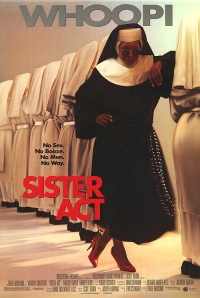
Sister Act is a 1992 American comedy film released by Touchstone Pictures. Directed by Emile Ardolino, it features musical arrangements by Marc Shaiman and stars Whoopi Goldberg as a Reno lounge singer who has been put under protective custody in a San Francisco convent and has to pretend to be a nun when a mob boss puts her on his hit list. Also in the cast are Maggie Smith, Kathy Najimy, Wendy Makkena, Mary Wickes, and Harvey Keitel. The film is #83 on Bravo's The 100 Funniest Movies list.
The film was followed by a 1993 sequel, Sister Act 2: Back in the Habit. It also inspired a musical stage version that premiered at the Pasadena Playhouse in Pasadena, California in 2006.
The film was followed by a 1993 sequel, Sister Act 2: Back in the Habit. It also inspired a musical stage version that premiered at the Pasadena Playhouse in Pasadena, California in 2006.
The Beatles

The Beatles were a pop and rock group from Liverpool, England formed in 1960. Primarily consisting of John Lennon (rhythm guitar, vocals), Paul McCartney (bass guitar, vocals), George Harrison (lead guitar, vocals) and Ringo Starr (drums, vocals) throughout their career, The Beatles are recognised for leading the mid-1960s musical "British Invasion" into the United States. Although their initial musical style was rooted in 1950s rock and roll and homegrown skiffle, the group explored genres ranging from Tin Pan Alley to psychedelic rock. Their clothes, styles, and statements made them trend-setters, while their growing social awareness saw their influence extend into the social and cultural revolutions of the 1960s. After the band broke up in 1970, all four members embarked upon solo careers.
The Beatles are one of the most commercially successful and critically acclaimed bands in the history of popular music, selling over a billion records internationally. In the United Kingdom, The Beatles released more than 40 different singles, albums, and EPs that reached number one, earning more number one albums (15) than any other group in UK chart history. This commercial success was repeated in many other countries; their record company, EMI, estimated that by 1985 they had sold over one billion records worldwide. According to the Recording Industry Association of America, The Beatles have sold more albums in the United States than any other band. In 2004, Rolling Stone magazine ranked The Beatles number one on its list of 100 Greatest Artists of All Time. According to that same magazine, The Beatles' innovative music and cultural impact helped define the 1960s, and their influence on pop culture is still evident today. In 2008, Billboard magazine released a list of top-selling Hot 100 artists to celebrate the chart's fiftieth anniversary; The Beatles reached #1 again.
The Beatles are one of the most commercially successful and critically acclaimed bands in the history of popular music, selling over a billion records internationally. In the United Kingdom, The Beatles released more than 40 different singles, albums, and EPs that reached number one, earning more number one albums (15) than any other group in UK chart history. This commercial success was repeated in many other countries; their record company, EMI, estimated that by 1985 they had sold over one billion records worldwide. According to the Recording Industry Association of America, The Beatles have sold more albums in the United States than any other band. In 2004, Rolling Stone magazine ranked The Beatles number one on its list of 100 Greatest Artists of All Time. According to that same magazine, The Beatles' innovative music and cultural impact helped define the 1960s, and their influence on pop culture is still evident today. In 2008, Billboard magazine released a list of top-selling Hot 100 artists to celebrate the chart's fiftieth anniversary; The Beatles reached #1 again.
Tom Waits
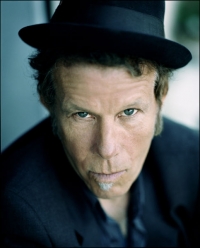
Thomas Alan Waits (born 7 December 1949) is an American singer-songwriter, composer, and actor. Waits has a distinctive voice, described by critic Daniel Durchholz as sounding "like it was soaked in a vat of bourbon, left hanging in the smokehouse for a few months, and then taken outside and run over with a car." With this trademark growl, his incorporation of pre-rock styles such as blues, jazz, and vaudeville, and experimental tendencies verging on industrial music, Waits has built up a distinctive musical persona. He has worked as a composer for movies and musical plays and as a supporting actor in films, including The Fisher King, Coffee & Cigarettes, Bram Stoker's Dracula, and Short Cuts. He was nominated for an Academy Award for his soundtrack work on One from the Heart.
Lyrically, Waits' songs contain atmospheric portrayals of bizarre, seedy characters and places, although he has also shown a penchant for more conventional ballads. He has a cult following and has influenced subsequent songwriters despite having little radio or music video support. His songs are best-known to the general public in the form of cover versions by more visible artistsâfor example, "Jersey Girl," performed by Bruce Springsteen; "Downtown Train" and "Tom Traubert's Blues" performed by Rod Stewart; and "Ol' '55," performed by the Eagles. Although Waits' albums have met with mixed commercial success in his native United States, they have occasionally achieved gold album sales status in other countries. He has been nominated for a number of major music awards and has won Grammy Awards for two albums, Bone Machine and Mule Variations.
Waits currently lives in Sonoma County, California with his wife and their three children.
Lyrically, Waits' songs contain atmospheric portrayals of bizarre, seedy characters and places, although he has also shown a penchant for more conventional ballads. He has a cult following and has influenced subsequent songwriters despite having little radio or music video support. His songs are best-known to the general public in the form of cover versions by more visible artistsâfor example, "Jersey Girl," performed by Bruce Springsteen; "Downtown Train" and "Tom Traubert's Blues" performed by Rod Stewart; and "Ol' '55," performed by the Eagles. Although Waits' albums have met with mixed commercial success in his native United States, they have occasionally achieved gold album sales status in other countries. He has been nominated for a number of major music awards and has won Grammy Awards for two albums, Bone Machine and Mule Variations.
Waits currently lives in Sonoma County, California with his wife and their three children.
Chopin

Frédéric Chopin (1 March 1810 – 17 October 1849) was a Polish composer and virtuoso pianist of the Romantic period. He is widely regarded as the greatest Polish composer, and ranks as one of music's greatest tone poets.
He was born in the village of Żelazowa Wola, in the Duchy of Warsaw, to a Polish mother and French-expatriate father, and in his early life was regarded as a child-prodigy pianist. In November 1830, at the age of 20, Chopin went abroad; following the suppression of the Polish November Uprising of 1830–31, he became one of many expatriates of the Polish "Great Emigration."
In Paris, he made a comfortable living as a composer and piano teacher, while giving few public performances. A Polish patriot,
Chopin's extant compositions were written primarily for the piano as a solo instrument. Though technically demanding, Chopin's style emphasizes nuance and expressive depth rather than virtuosity. Chopin invented musical forms such as the ballade and was responsible for major innovations in forms such as the piano sonata, waltz, nocturne, étude, impromptu and prelude. His works are mainstays of Romanticism in 19th-century classical music.
He was born in the village of Żelazowa Wola, in the Duchy of Warsaw, to a Polish mother and French-expatriate father, and in his early life was regarded as a child-prodigy pianist. In November 1830, at the age of 20, Chopin went abroad; following the suppression of the Polish November Uprising of 1830–31, he became one of many expatriates of the Polish "Great Emigration."
In Paris, he made a comfortable living as a composer and piano teacher, while giving few public performances. A Polish patriot,
Chopin's extant compositions were written primarily for the piano as a solo instrument. Though technically demanding, Chopin's style emphasizes nuance and expressive depth rather than virtuosity. Chopin invented musical forms such as the ballade and was responsible for major innovations in forms such as the piano sonata, waltz, nocturne, étude, impromptu and prelude. His works are mainstays of Romanticism in 19th-century classical music.
The Dresden Dolls

The Dresden Dolls are an American musical duo from Boston, Massachusetts. Formed in 2000, the group consists of Amanda Palmer (vocals, piano, harmonica, ukelele) and Brian Viglione (drums, percussion, guitar, bass guitar, vocals). The two describe their style as "Brechtian punk cabaret", a phrase invented by Palmer because she was "terrified" that the press would invent a name that "would involve the word gothic." The Dresden Dolls are part of an underground dark cabaret movement that started gaining momentum in the early 1990s.
Schumann

Robert Schumann, sometimes given as Robert Alexander Schumann, (June 8, 1810 – July 29, 1856) was a German composer, aesthete and influential music critic. He is one of the most famous Romantic composers of the 19th century.
He had hoped to pursue a career as a virtuoso pianist, having been assured by his teacher Friedrich Wieck that he could become the finest pianist in Europe after only a few years of study with him. However, a hand injury prevented those hopes from being realized, and he decided to focus his musical energies on composition. Schumann's published compositions were, until 1840, all for the piano; he later composed works for piano and orchestra, many lieder (songs for voice and piano), four symphonies, an opera, and other orchestral, choral and chamber works. His writings about music appeared mostly in the Neue Zeitschrift für Musik ("The New Journal for Music"), a Leipzig-based publication that he jointly founded.
In 1840, after a long and acrimonious legal battle with his piano instructor Friedrich Wieck, Schumann married Wieck's daughter, pianist Clara Wieck, a considerable figure of the Romantic period in her own right. Clara Wieck showcased many works by her husband as well. For the last two years of his life, after an attempted suicide, Schumann was confined to a mental institution.
He had hoped to pursue a career as a virtuoso pianist, having been assured by his teacher Friedrich Wieck that he could become the finest pianist in Europe after only a few years of study with him. However, a hand injury prevented those hopes from being realized, and he decided to focus his musical energies on composition. Schumann's published compositions were, until 1840, all for the piano; he later composed works for piano and orchestra, many lieder (songs for voice and piano), four symphonies, an opera, and other orchestral, choral and chamber works. His writings about music appeared mostly in the Neue Zeitschrift für Musik ("The New Journal for Music"), a Leipzig-based publication that he jointly founded.
In 1840, after a long and acrimonious legal battle with his piano instructor Friedrich Wieck, Schumann married Wieck's daughter, pianist Clara Wieck, a considerable figure of the Romantic period in her own right. Clara Wieck showcased many works by her husband as well. For the last two years of his life, after an attempted suicide, Schumann was confined to a mental institution.
Balakirev

Mily Alexeyevich Balakirev (Russian: Милий Алексеевич Балакирев, Milij Alekseevič Balakirev, 1910) was a Russian pianist, conductor and composer. He is known today primarily for his work promoting musical nationalism in Russia. Working in conjunction with critic Vladimir Stasov, Balakirev brought together the composers now known as the Five, encouraged their efforts and acted as a musical midwife both for them and for Pyotr Ilyich Tchaikovsky.
Balakirev began his career as a pivotal figure in Russian music by extending and developing the fusion began by Mikhail Glinka of traditional Russian and boldly experimental music. In doing so, he established musical patterns that could express overtly nationalistic feeling. He not only demonstrated in his own works how this could be done, but also by taking amateur musicians of prescribed musical education but enormous potential such as Modest Mussorgsky, Alexander Borodin and Nikolai Rimsky-Korsakov, he imparted his own musical beliefs and passed them on to underlie the thinking of his pupils.
Balakirev found himself in an unusual position in his later yers of attending premieres of works he had begun long ago but had only recently completed. For instance, he began writing his First Symphony in 1864 but finished it in 1897. Often, the musical ideas normally associated with Rimsky-Korsakov or Borodin actually originated in Balakirev's compositions. However, his slowness in bringing his works before the public robbed him of credit for his inventiveness. Also, pieces which if completed in the 1860s and 70s would have enjoyed success if they had been performed at that time actually made a much smaller impact when they were introduced toward the end of the composer's life because they had been overtaken by the accomplishments of younger composers. The exception to this is his oriental fantasy Islamey, which is still popular among pianists.
Balakirev began his career as a pivotal figure in Russian music by extending and developing the fusion began by Mikhail Glinka of traditional Russian and boldly experimental music. In doing so, he established musical patterns that could express overtly nationalistic feeling. He not only demonstrated in his own works how this could be done, but also by taking amateur musicians of prescribed musical education but enormous potential such as Modest Mussorgsky, Alexander Borodin and Nikolai Rimsky-Korsakov, he imparted his own musical beliefs and passed them on to underlie the thinking of his pupils.
Balakirev found himself in an unusual position in his later yers of attending premieres of works he had begun long ago but had only recently completed. For instance, he began writing his First Symphony in 1864 but finished it in 1897. Often, the musical ideas normally associated with Rimsky-Korsakov or Borodin actually originated in Balakirev's compositions. However, his slowness in bringing his works before the public robbed him of credit for his inventiveness. Also, pieces which if completed in the 1860s and 70s would have enjoyed success if they had been performed at that time actually made a much smaller impact when they were introduced toward the end of the composer's life because they had been overtaken by the accomplishments of younger composers. The exception to this is his oriental fantasy Islamey, which is still popular among pianists.
Loreena McKennitt

Loreena Isabel Irene McKennitt, CM, OM, (born February 17, 1957) is a Canadian singer, composer, harpist, accordionist and pianist who writes, records and performs world music with Celtic and Middle Eastern themes. McKennitt is known for her refined, warbling soprano vocals. She has sold more than 14 million records worldwide.
Gabriel Faure

Gabriel Urbain Fauré (12 May 1845 – 4 November 1924) was a French composer, organist, pianist, and teacher. He was the foremost French composer of his generation, and his musical style influenced many 20th century composers. His harmonic and melodic language affected how harmony was later taught.
Coldplay

Coldplay are a rock band formed in London, England in 1997. The group comprises vocalist/pianist/guitarist Chris Martin, lead guitarist Jonny Buckland, bassist Guy Berryman, and drummer/multi-instrumentalist Will Champion. Coldplay have sold 34.6 million albums, and are also known for their hit singles, such as "Yellow", "The Scientist", "Speed of Sound", "Fix You", "Viva la Vida" and the Grammy Award-winning "Clocks".
Coldplay achieved worldwide fame with the release of their single "Yellow", followed by their debut album, Parachutes (2000), which was nominated for the Mercury Prize. Its follow-up, A Rush of Blood to the Head (2002) won multiple awards such as NME's Album of the Year and was later included on Rolling Stone magazine's 500 Greatest Albums of All Time list, ranking at #473. Their next release, X&Y (2005), received a slightly less enthusiastic yet still generally positive reception. The band's fourth studio album, Viva la Vida or Death and All His Friends (2008), was produced by Brian Eno and released again to largely favourable reviews. All of Coldplay's albums have enjoyed great commercial success.
Coldplay's early material was compared to acts such as Jeff Buckley, U2, and Travis. Coldplay have been an active supporter of various social and political causes, such as Oxfam's Make Trade Fair campaign and Amnesty International. The group have also performed at various charity projects such as Band Aid 20, Live 8, and the Teenage Cancer Trust.
Coldplay achieved worldwide fame with the release of their single "Yellow", followed by their debut album, Parachutes (2000), which was nominated for the Mercury Prize. Its follow-up, A Rush of Blood to the Head (2002) won multiple awards such as NME's Album of the Year and was later included on Rolling Stone magazine's 500 Greatest Albums of All Time list, ranking at #473. Their next release, X&Y (2005), received a slightly less enthusiastic yet still generally positive reception. The band's fourth studio album, Viva la Vida or Death and All His Friends (2008), was produced by Brian Eno and released again to largely favourable reviews. All of Coldplay's albums have enjoyed great commercial success.
Coldplay's early material was compared to acts such as Jeff Buckley, U2, and Travis. Coldplay have been an active supporter of various social and political causes, such as Oxfam's Make Trade Fair campaign and Amnesty International. The group have also performed at various charity projects such as Band Aid 20, Live 8, and the Teenage Cancer Trust.
Final fantasy IV

Final Fantasy IV (ファイナルファンタジーIV Fainaru Fantajī Fō, also known as Final Fantasy II for its initial North American release) is a role-playing video game developed and published by Square (now Square Enix) for the Super Nintendo Entertainment System. Released in 1991, it is the fourth main installment of the Final Fantasy series. The game's story follows Cecil, a dark knight, as he tries to prevent the sorcerer Golbez from seizing powerful crystals and destroying the world. He is joined on this quest by a frequently changing group of allies. Final Fantasy IV introduced innovations that became staples of the Final Fantasy series and role-playing games in general. Its "Active Time Battle" system was used in five subsequent Final Fantasy games, and unlike prior games in the series, IV gave each character their own unchangeable character class.
Final Fantasy IV has been ported to several other platforms with varying differences. An enhanced remake, also called Final Fantasy IV, with 3D graphics was released for the Nintendo DS in 2007 and 2008. The game was re-titled Final Fantasy II during its initial release outside Japan as the original Final Fantasy II and Final Fantasy III had not been released outside Japan at the time. However, later localizations used the original title.
With its character-driven plot, use of new technologies and critically acclaimed score by Nobuo Uematsu, Final Fantasy IV is regarded as a landmark of the series and the role-playing genre. The various incarnations of the game have sold more than four million copies worldwide. A sequel, Final Fantasy IV: The After Years, was released for Japanese mobile phones in 2008, and worldwide via the Wii Shop Channel on June 1, 2009. In 2011, both Final Fantasy IV and The After Years were released for the PlayStation Portable as part of the compilation Final Fantasy IV: The Complete Collection, which also included a new game, set between the two; Final Fantasy IV: Interlude. Ports of the Nintendo DS remake were released for iOS in 2012, for Android in 2013 and for Windows in 2014.
Final Fantasy IV has been ported to several other platforms with varying differences. An enhanced remake, also called Final Fantasy IV, with 3D graphics was released for the Nintendo DS in 2007 and 2008. The game was re-titled Final Fantasy II during its initial release outside Japan as the original Final Fantasy II and Final Fantasy III had not been released outside Japan at the time. However, later localizations used the original title.
With its character-driven plot, use of new technologies and critically acclaimed score by Nobuo Uematsu, Final Fantasy IV is regarded as a landmark of the series and the role-playing genre. The various incarnations of the game have sold more than four million copies worldwide. A sequel, Final Fantasy IV: The After Years, was released for Japanese mobile phones in 2008, and worldwide via the Wii Shop Channel on June 1, 2009. In 2011, both Final Fantasy IV and The After Years were released for the PlayStation Portable as part of the compilation Final Fantasy IV: The Complete Collection, which also included a new game, set between the two; Final Fantasy IV: Interlude. Ports of the Nintendo DS remake were released for iOS in 2012, for Android in 2013 and for Windows in 2014.
Olivier Messaien

Olivier Eugène Prosper Charles Messiaen (UK: /ˈmɛsiæ̃/, US: /mɛˈsjæ̃, meɪˈsjæ̃, mɛˈsjɒ̃/, French: ; December 10, 1908 – April 27, 1992) was a French composer, organist, and ornithologist, one of the major composers of the 20th century. His music is rhythmically complex; harmonically and melodically he employs a system he called modes of limited transposition, which he abstracted from the systems of material generated by his early compositions and improvisations. He wrote music for chamber ensembles and orchestra, vocal music, as well as for solo organ and piano, and also experimented with the use of novel electronic instruments developed in Europe during his lifetime.
Bach

Johann Sebastian Bach (31 March 1685 – 28 July 1750) was a German composer and organist whose sacred and secular works for choir, orchestra, and solo instruments drew together the strands of the Baroque period and brought it to its ultimate maturity. Although he introduced no new forms, he enriched the prevailing German style with a robust contrapuntal technique, an unrivalled control of harmonic and motivic organisation in composition for diverse musical forces, and the adaptation of rhythms and textures from abroad, particularly Italy and France.
Revered for their intellectual depth and technical and artistic beauty, Bach's works include the Brandenburg concertos; the Goldberg Variations; the English Suites, French Suites, Partitas, and Well-Tempered Clavier; the Mass in B Minor; the St. Matthew Passion; the St. John Passion; The Musical Offering; The Art of Fugue; the Sonatas and Partitas for violin solo; the Cello Suites; more than 200 surviving cantatas; and a similar number of organ works, including the celebrated Toccata and Fugue in D Minor.
While Bach's fame as an organist was great during his lifetime, he was not particularly well-known as a composer. His adherence to Baroque forms and contrapuntal style was considered "old-fashioned" by his contemporaries, especially late in his career when the musical fashion tended towards Rococo and later Classical styles. A revival of interest and performances of his music began early in the 19th century, and he is now widely considered to be one of the greatest composers in the Western tradition.
Revered for their intellectual depth and technical and artistic beauty, Bach's works include the Brandenburg concertos; the Goldberg Variations; the English Suites, French Suites, Partitas, and Well-Tempered Clavier; the Mass in B Minor; the St. Matthew Passion; the St. John Passion; The Musical Offering; The Art of Fugue; the Sonatas and Partitas for violin solo; the Cello Suites; more than 200 surviving cantatas; and a similar number of organ works, including the celebrated Toccata and Fugue in D Minor.
While Bach's fame as an organist was great during his lifetime, he was not particularly well-known as a composer. His adherence to Baroque forms and contrapuntal style was considered "old-fashioned" by his contemporaries, especially late in his career when the musical fashion tended towards Rococo and later Classical styles. A revival of interest and performances of his music began early in the 19th century, and he is now widely considered to be one of the greatest composers in the Western tradition.
Tchaikovsky

Pyotr Il'yich Tchaikovsky (May 7 1840 â November 6 1893) was a Russian composer of the Romantic era. While not part of the nationalistic music group known as "The Five", Tchaikovsky wrote music which, in the opinion of Harold Schonberg, was distinctly Russian: plangent, introspective, with modally-inflected melody and harmony.
Aesthetically, Tchaikovsky remained open to all aspects of Saint Petersburg musical life. He was impressed by Serov and Balakirev as well as the classical values upheld by the conservatory. Both the progressive and conservative camps in Russian music at the time attempted to win him over. Tchaikovsky charted his compositional course between these two factions, retaining his individuality as a composer as well as his Russian identity. In this he was influenced by the ideals of his teacher Nikolai Rubinstein and Nikolai's brother Anton.
Tchaikovsky's musical cosmopolitanism led him to be favored by many Russian music-lovers over the "Russian" harmonies and styles of Mussorgsky, Borodin and Rimsky-Korsakov.
Nonetheless he frequently adapted Russian traditional melodies and dance forms in his music, which enhanced his success in his home country. The success in St. Petersburg at the premiere of his Third Orchestral Suite may have been due in large part to his concluding the work with a polonaise. He also used a polonaise for the final movement of his Third Symphony.
Aesthetically, Tchaikovsky remained open to all aspects of Saint Petersburg musical life. He was impressed by Serov and Balakirev as well as the classical values upheld by the conservatory. Both the progressive and conservative camps in Russian music at the time attempted to win him over. Tchaikovsky charted his compositional course between these two factions, retaining his individuality as a composer as well as his Russian identity. In this he was influenced by the ideals of his teacher Nikolai Rubinstein and Nikolai's brother Anton.
Tchaikovsky's musical cosmopolitanism led him to be favored by many Russian music-lovers over the "Russian" harmonies and styles of Mussorgsky, Borodin and Rimsky-Korsakov.
Nonetheless he frequently adapted Russian traditional melodies and dance forms in his music, which enhanced his success in his home country. The success in St. Petersburg at the premiere of his Third Orchestral Suite may have been due in large part to his concluding the work with a polonaise. He also used a polonaise for the final movement of his Third Symphony.
Yiruma

Yiruma (born February 15 1978, Seoul, Korea) is a South Korean piano music composer. He is married to Son Hye-im.
Yiruma is well-known throughout the world, and his albums are sold all over Asia, as well as the United States and Europe. His most famous pieces are "Kiss the Rain", and also "River Flows in You". These pieces are widely mistaken for being associated with the movie Twilight. Although he formerly held dual citizenship as a citizen of the United Kingdom and South Korea, in July 2006 he gave up his British citizenship and entered the Republic of Korea Navy to begin his military service, which is compulsory for all male South Koreans. He has lived in Osaka, Japan for 5 years to promote album sales before giving up his dual citizenship.
Yiruma is well-known throughout the world, and his albums are sold all over Asia, as well as the United States and Europe. His most famous pieces are "Kiss the Rain", and also "River Flows in You". These pieces are widely mistaken for being associated with the movie Twilight. Although he formerly held dual citizenship as a citizen of the United Kingdom and South Korea, in July 2006 he gave up his British citizenship and entered the Republic of Korea Navy to begin his military service, which is compulsory for all male South Koreans. He has lived in Osaka, Japan for 5 years to promote album sales before giving up his dual citizenship.
 Sheet Music 365 is a site for those who wants to access popular sheet music easily,
letting them download the sheet music for free for trial purposes.
It's completely free to download and try the listed sheet music, but you have to delete the files after 24 hours of trial.
Don't forget, if you like the piece of music you have just learned playing,
treat the artist with respect, and go buy the original sheet music.
Sheet Music 365 is a site for those who wants to access popular sheet music easily,
letting them download the sheet music for free for trial purposes.
It's completely free to download and try the listed sheet music, but you have to delete the files after 24 hours of trial.
Don't forget, if you like the piece of music you have just learned playing,
treat the artist with respect, and go buy the original sheet music.